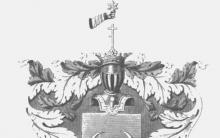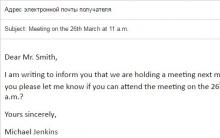Over the course of a long life, I have heard this phrase many times - “the code of honor of musketeers.” But no one could really talk about it - specifically. When the Internet appeared, I couldn’t find any specifics. I had to sit down and re-read the book. Before you is a modest work on determining the nominations of the “code of honor”. I would be glad if readers add to this list or tell how the “code” worked in their lives.
"Code of Honor" of the Musketeers.
1. All for one, one for all! (All four said in chorus the words suggested to them by D’Artagnan).
2. "Do not submit to anyone. Except the king, the cardinal and Monsieur de Treville." This was the advice of Father D'Artagnan. Very reminiscent of N. Leskov’s description of Golovan – Ivan Flyagin: “official and faithful.”
3. De Treville’s advice to the Gascon: If someone starts a quarrel with you, try to avoid it, be the instigator even a ten-year-old child. If you are attacked, day or night, retreat and do not be ashamed.
4. The nobleman has only one word.
Athos: Monsignor, we are nobles and did not lie even to save lives!
Planchet: But I’m not a nobleman, so I’m allowed to lie.
5. Athos: Keep the secret entrusted to you. (At the same time, Athos asked his friend whose secret it was and whether those people allowed anyone to be initiated into this secret.)
Porthos was wounded, but lied that he had stumbled in the duel. D'Artagnan listened to everything, but, knowing the truth, decided not to hurt his friend with the truth.
Despite his youth, our Gascon was a very cautious young man. He pretended to believe everything that the boastful musketeer told him, since he was convinced that no friendship could withstand the revelation of a secret, especially if this SECRET hurts self-love, and besides, we always have a certain moral superiority over those whose lives we know .
Athos, under the influence of wine, tells the Gascon the whole truth about himself and my lady. Waking up the next morning, he pretends, like Porthos, that he has babbled nonsense. D'Artagnan: You didn't say anything special... I don't remember anything. And he even lies: I remember, as if in a dream, as if we were talking about the hanged.
6. Attitude to money:
Athos kills the Englishman. They solve the problem: who to give the wallet with his money to. They decide: to the servant of this Englishman.
D'Artagnan in the bastion of La Rochelle kills one of Milady's accomplices. The second accomplice was wounded. So the young man threw the wallet to this wounded man. I didn’t get enough of it.
The executioner also didn’t take the money.” And now let this woman also know that I am not performing my craft, but my duty.”
Athos never bargained. If the item suited him, he paid the required amount every time, without even trying to reduce it.
7. Porthos, seeing that he is completely in the power of the enemy, ADMITTED HIMSELF TO BE DEFEATED.
8. (Continued from No. 7). After which the stranger asked what his name was, and, having learned that his name was Porthos, and not D’Artagnan, INVENTED HIM TO LEAN ON HIS HAND, brought him to the hotel, jumped on his horse and disappeared.
9. D’Artagnan did not find anything more witty, as my lady advised FORGIVE de Ward and abandon her cruel plans.
10. Athos tells the Gascon his love story, but he talks in a veiled way - as if not about himself, but about some person, that is, he, remembering the words of A. Chekhov, does not humiliate himself in the eyes of his interlocutor.
11. They solve the problem of where the Gascon should go: one date with a lady, the other with a cardinal. Aramis: A courteous gentleman cannot fail to attend a date appointed for him by a lady, but a prudent nobleman can find an excuse for not appearing before his Eminence, especially if he has reason to believe that he is not being invited out of courtesy.
12. D’Artagnan talks about what happened to him in the bastion. But he LIES…. “I will not forgive you for making me come without allowing me to rest after this night, after I took and destroyed the bastion! Oh, what a pity, gentlemen, that you were not there! It was hot!” You can remember how Nikolai Rostov lied in the same way.
13. D'Artagnan: Dear Athos, I admire you, but in the end WE ARE STILL WRONG.
14. Felton: Since the captive is still a woman, I wanted to show her the attention that every well-bred person is obliged to show to a woman, if not for her sake, then at least FOR YOUR OWN DIGNITY.
15. Aramis: Silence is the last joy of the unfortunate; DO NOT SHOW YOUR GRIEF TO ANYONE.
16. All intrigues are over. The Gordian knots are untied. Richelieu, addressing the Chevalier de Rochefort and D'Artagnan, says: Rochefort, before you is Monsieur d'Artagnan. I ACCEPT him to be the number of MY FRIENDS, and therefore KISS BOTH and behave SMARTLY if you want to save your heads.
17. It is not shameful to live at the expense of your mistresses. (Aramis and Porthos - however, the latter still got married, although the reason was not love, but a chest with an inheritance.). [In those days they paved their way with the help of women and were not ashamed of it.]
1. All for one, one for all!(All four said in chorus the words suggested to them by d’Artagnan).
2. " Do not submit to anyone. Besides the king, the cardinal and Monsieur de Treville" This was the advice of Father d'Artagnan. Very reminiscent of N. Leskov’s description of Golovan – Ivan Flyagin: “official and faithful.”
3. De Treville’s advice to the Gascon: If someone starts a quarrel with you, try to avoid it, even if the instigator was a ten-year-old child. If you are attacked, day or night, retreat and do not be ashamed.
4. The nobleman has only one word.
- Athos: Monsignor, We are nobles and did not lie even to save our lives!
- Planchet: But I’m not a nobleman, so I’m allowed to lie.
5. Athos: Keep the secret entrusted to you.(At the same time, Athos asked his friend whose secret it was and whether those people allowed anyone to be initiated into this secret.)
- Porthos was wounded, but lied that he had stumbled in the duel. D'Artagnan listened to everything, but Knowing the truth, he decided not to hurt his friend with his truth.
- Despite his youth, our Gascon was a very cautious young man. He pretended to believe everything that the boastful musketeer told him, since he was convinced that no friendship could withstand the revelation of a secret, especially if this SECRET HURTS PRIDE Moreover, we always have a certain moral superiority over those whose lives we know.
- Athos, under the influence of wine, tells the Gascon the whole truth about himself and my lady. Waking up the next morning, he pretends, like Porthos, that he has babbled nonsense. D'Artagnan: You didn't say anything special... I don't remember anything. And he even lies: I remember, as if in a dream, as if we were talking about the hanged.
6. Attitude towards money:
- Athos kills the Englishman. They solve the problem: who to give the wallet with his money to. They decide: to the servant of this Englishman.
- D'Artagnan in the bastion of La Rochelle kills one of Milady's accomplices. The second accomplice was wounded. So the young man threw the wallet to this wounded man. I didn’t get enough of it.
- The executioner also did not take the money: “Now let this woman also know that I am not performing my craft, but my duty.”
- Athos never bargained. If the item suited him, he paid the required amount every time, without even trying to reduce it.
7. Porthos, seeing that he was completely in the power of the enemy, ADMITTED HIMSELF TO BE DEFEATED.
8. (Continued from No. 7). After which the stranger asked what his name was, and, having learned that his name was Porthos, and not D’Artagnan, INVENTED HIM TO LEAN ON HIS HAND, brought him to the hotel, jumped on his horse and disappeared.
9. D’Artagnan did not find anything more witty than he advised Milady to FORGIVE de Ward and abandon her cruel plans.
10. Athos tells the Gascon the story of his love, but he tells it in a veiled way - as if not about himself, but about some person, that is, he, remembering the words of A. Chekhov, does not humiliate himself in the eyes of his interlocutor.
11. They solve the problem of where the Gascon should go: one date with a lady, the other with a cardinal. Aramis: A courteous gentleman cannot fail to attend a date appointed for him by a lady, but a prudent nobleman can find an excuse for not appearing before his Eminence, especially if he has reason to believe that he is not being invited out of courtesy.
12. D’Artagnan talks about what happened to him in the bastion. But he’s LIEING.... “I won’t forgive you for making me come without letting me rest after this night, after I took and destroyed the bastion! Oh, what a pity, gentlemen, that you were not there! It was hot!”
13. – Dear Athos, I admire you, but in the end WE ARE STILL WRONG.
14. Felton: Since the captive is still a woman, I wanted to show her the attention that every well-bred man is obliged to show to a woman, if not for her sake, then at least for the sake of his OWN DIGNITY.
15. Aramis: Silence is the last joy of the unfortunate; DO NOT SHOW YOUR GRIEF TO ANYONE.
16. All intrigues are over. The Gordian knots are untied. Richelieu, addressing the Chevalier de Rochefort and d'Artagnan, says: Rochefort, before you is Monsieur d'Artagnan. I ACCEPT him to be the number of MY FRIENDS, and therefore KISS BOTH and behave SMARTLY if you want to save your heads.
17. It is not shameful to live at the expense of your mistresses. (Aramis and Porthos - however, the latter still got married, although the reason was not love, but a chest with an inheritance.). [In those days they paved their way with the help of women and were not ashamed of it.]
Ill. Maurice Leloir
Compiled by L. Suvorova
You will greatly appreciate it if you use this block of buttons and “+1”:
You can see other developments on works:
* Dumas A. “The Three Musketeers” /
The myth of the nobility of the musketeers*
To begin with, it must be said that this article is not at all intended to somehow discredit or insult Alexandre Dumas or his famous work. Dumas did an excellent job with the task that he took on and wrote an adventure novel that is worthy of its popularity. We will talk about the modern perception of nobility and a certain cliche that the heroes of the novel “The Three Musketeers” received. It is quite possible that Dumas himself would be surprised if he knew what his work led to and what his characters became for a person of the 20th-21st centuries.
Where did the myth come from that the main characters of A. Dumas’s novel “The Three Musketeers” are the standard of nobility? Maybe the reason for this is the sea of film adaptations of the famous novel? After all, any film adaptation has its own director’s view and it often does not correspond much to the spirit of the book. Musketeers in films usually appear in an ennobled form. They fight “for a just cause,” against the “vile” Cardinal Richelieu, save Queen Anne, reduce the number of guards per unit area of the city of Paris, and sometimes the whole of France. In general, they are “ours”, the guards are “not ours”. Everything is simple and clear. Especially if you don’t take into account Dumas’s novel, in which those same “noble heroes” appear in a slightly different light.
There is no point in retelling the novel. Let's look at some of the most striking moments as the writer has them.
What can you say about the main character - D'Artagnan:
He came to Paris to pursue a career. Quite a worthy occupation for a nobleman, you can’t say anything about it.
He dreams of somehow making the most of his new friends (Athos, Porthos and Aramis) to achieve his goals and ponders this idea in his spare time.
He seduces the grocer's wife, dreaming of starting a relationship with her.
Having intercepted a letter addressed to a certain Count De Ward, at night, under the name of this very Count De Ward, he sneaks into Milady’s bedroom, has a good time, simultaneously spying and finding out the innermost secrets of this woman.
He helps cover up the “pranks” of Queen Anne of Austria, who started a love relationship with the Duke of Buckingham, the minister of a hostile country, and so on...
His friend Athos, who most often in film adaptations plays the role of the most noble of the four:
Dumas speaks quite clearly about his addiction to getting drunk.
Athos is equally clearly shown as a player who is easily ready to lose the property of his closest friend (that is, D'Artagnan, in a drunken shop, or out of boredom, but probably if he had come across the property of Porthos or Aramis, he would have also lost without hesitation ).
Having barely discovered the mark on his beloved wife, Athos, not discerning who is right and who is wrong, hangs her on a tree.
This is one of the most striking manifestations of his character.
A vain deceiver who, in order to show off, acquires an expensively decorated sword belt. But since he doesn’t have enough money for a whole sling, the second half is an ordinary strap. To disguise this, Porthos wears a long cloak and tells everyone that he has a cold.
Tries to use women to get money, which he undoubtedly really needs (episodes with Madame Coquenard).
In general, he is a narrow-minded type who wins due to his physical strength, and even then not for everyone. Due to his own stupidity and lack of restraint, he manages to get wounded where an intelligent person would pass by and calmly continue the journey (see the journey of D'Artagnan and others for the pendants).
At first he wanted to become an abbot, then he was very offended because someone said something nasty to him, he joined the musketeers, learned to fight, killed the offender - and still dreams of becoming an abbot.
Aramis either remembers that he was going to become an abbot and begins to behave like an ostentatious saint, then again he remembers that he is a musketeer and forgets about all his ostentatious holiness.
Of course, musketeers are the same people with the same weaknesses as everyone else. But does this give reason to consider D'Artagnan and his company a standard of nobility?
Now more specifically about the deeds of the famous musketeers. The largest of these deeds is saving the queen's honor by obtaining pendants, which she carelessly gave to Buckingham. But let's look at the situation from the very beginning.
So, D'Artagnan comes to Paris to become a musketeer and serve the king. He refuses to serve the cardinal (for vague reasons that most of his friends are musketeers, not guards). One can understand his motive: it is more pleasant to serve where your friends. And it’s easier to hit the face with four people. And you’ll still have to find a common language with the guards, so that you don’t have time to hit the face yourself...
Let's leave only the fact itself, without emotions. D'Artagnan dreams of serving the king and France, with his sword and his honor. So, the cardinal does not serve France? And serving the cardinal, D'Artagnan, of course, will be against France? It turns out somewhat strange and illogical. But D'Artagnan is only 18 years old, he is hot-tempered, he is a maximalist. Still, the musketeers are dearer to him, especially since there is some kind of rivalry between the king's musketeers and the cardinal's guards. Therefore, in any case, he will have to join one side and , as a result, turn out to be against the other. But let's go further.
Queen Anne of Austria starts a relationship with the Duke of Buckingham and thereby discredits herself. She is not a maid who can make connections on the side. And for a chambermaid such an action is reprehensible. And even more so for the queen. In essence, treason against the king is equivalent to treason against the state. And so it is. Kings and queens cannot dispose of themselves as easily as ordinary people can. Because kings and queens are at the top, like on top of a mountain. And all the morality and morality of the state directly depends on their morality and morality. If the king behaves depravedly, then how can he keep all the other people, his subjects, from debauchery?
The queen must be flawless. And the fact that she simply sees the duke, without even entering into direct (sexual) contact with him, is already discrediting her honor and the honor of the king, her husband. And D’Artagnan, in his desire to “outplay” Cardinal Richelieu and help Constance, the queen’s maid, helps the queen and Duke Buckingham, her lover. Thus, D’Artagnan directly and directly, without any doubt, betrays the king whom he so sought to serve, so as not to serve the cardinal.
Where is the nobility?
Milady serves the cardinal. Moreover, mind you, with absolute fidelity, ready to carry out any order. She poisons Constance Bonacieux because she cannot otherwise get “this intriguer” out of the game. By the way, according to the book, Constance is a much more seasoned person who really knows how to weave intrigues than the innocent “girl” that they mostly make of her in films. But who said that it is allowed to poison an intriguer? Of course not.
The musketeers, piling together, somehow, in a crowd and with a creak, catch Milady and execute her, without having any right to do so. They are not a court, not an Inquisition, not some other authority. In essence, they are committing a murder that, from their point of view, is justified. But can it be said that the “noble musketeers”, who crush the people themselves in batches, help political intrigues and betray their king, have at least some moral right to consider themselves judges and pass sentences?
Where is the nobility? Or is killing Milady a noble act?
Of course, the novel does not consist only of the story with the pendants and the story with Milady. But find at least one moment in the novel in which the musketeers could be called noble. So that their actions clearly indicate that they are good, positive and an example to follow from the point of view of us, modern people. No, the fact that they endure a battle on a dare, hiding in the bastion of a fortress for a certain amount of time, certainly speaks of their courage. But courage and nobility are by no means identical concepts.
Actually, we do not discuss the advantages and disadvantages of Dumas as a writer. Dumas, for his part, painted a fairly unbiased picture, showing his characters as they are. Another fact is striking: why did we, our contemporaries, choose the musketeers as a certain standard of nobility? There are a lot of film adaptations, a lot of songs in which the musketeers are really noticeably ennobled and presented as a kind of role model.
By the way, the authors of the article were unable to recall a single film in which anyone would have shown that Athos was, in fact, according to Dumas, a drunkard. Just as not a single director has played up the moment when the same Athos, out of drunkenness and boredom, first loses his property, and then the property of D'Artagnan. All the slippery moments from the novel are released during the film adaptation, and only those that are left and strengthened which, as a result, create a certain “ideal image”.
If we consider other literary works, we can find examples of much more noble behavior both in earlier eras and in later ones. For example, Ivanhoe Walter Scott. A valiant knight without fear or reproach. He also has minor weaknesses, but overall this image is much more consistent with ideas of nobility. He does not betray his king, even when all circumstances are against him. He is selflessly devoted to the lady of his heart, brave, and does not offend those who are weaker. Ivanhoe is also popular, but he cannot keep up with the musketeers. And it is not he who becomes the notorious standard of noble behavior, unlike the musketeers.
Let's take a later example. There is an opinion that the Wild West is a place and era in which human life had absolutely no value. Cowboys, bandits, Indians - everyone killed each other in as many numbers as possible and were not at all embarrassed by it. But that's not true. It is enough to turn to such a well-known work as “Lonesome Dove” by Larry McMurtry. And it turns out that it was in the Wild West that human life was very expensive. Due to the fact that he accidentally shot a man, one of the main characters is forced to hide. Because murder is punishable by death. And although many have seen and know that the murder happened by accident, the person still runs because he fears that the fact of the murder itself will still be considered more significant than the fact that this murder happened by accident - and then he will be hanged. And another person who accidentally shoots someone is actually hanged.
Human life in the Wild West, according to McMurtry's work, is very expensive. To put it figuratively: a human life is worth as much as a human life is worth. And according to Dumas’ novel, human life is worth nothing. A nobleman freely kills another nobleman in a duel and often manages to evade responsibility in various ways. And no one even considers the murder of a commoner by a nobleman. This should not be considered a misdemeanor. Musketeers do not value their own lives or those of others.
Of course, this is a completely different mentality and one cannot compare the people of the century of Ivanhoe, the century of the musketeers and the century of McMurtry’s heroes. But there is no need to compare here. Here you just need to think: it turns out that we, modern people, choose the so-called “gallant age” in France as the standard of nobility, although, it would seem, this is the most depraved time and the most depraved country. And it is enough to look at the neighboring bookshelves to find examples much more worthy of the title of example of nobility.
This is not about Dumas. He did his job well, painted an unbiased, plausible picture, and endowed his characters with both positive and negative qualities. And the modern reader of the 21st century, as well as the 20th, despite the fact that there are examples in literature more worthy of imitation, nevertheless chooses the musketeers. Maybe this is really due to the many film adaptations in which the musketeers are always and invariably ennobled and shown in the most favorable light.
May be...
Sections: Literature
Lesson objectives:
- Educational. Formation of moral and aesthetic feelings in students through the categories and values of the novel’s existence: good and evil, truth, justice, conscience, friendship and love, freedom and responsibility.
- Developmental. Development of imaginative and analytical thinking, creative imagination and reading culture;
- formation of ideas about the specifics of literature among other arts; development of oral and written speech of students. Educational.
Development of skills in analyzing a work of art using basic literary concepts and necessary information on the history of literature; identification of specific historical and universal human content in a work. Methodical techniques:
student's message, retelling and analysis of the text, conversation on issues, dramatization of an episode of Dumas' novel "The Three Musketeers". Equipment:
presentation for the lesson, fragments of the film G. Jungvald - Khilkevich "D, Artagnan and the Three Musketeers".
During the classes
Teacher's opening speech (!)
Dear guys, today we will take a journey through the pages of a wonderful work, one of the most exciting books of foreign literature, which has influenced the minds of many generations of people around the world, we will take a journey through the pages of A. Dumas’ novel “The Three Musketeers”. Please write down the topic of today's lesson."
(!) Goals of our lesson: Briefly retell and analyze your favorite episodes of the novel.
Reveals the significance of this work on the development of other arts.
Continue learning the skills of analyzing a work of art using basic literary concepts.
Develop the ability to build a monologue.
Traveling around the country of Literature, you read many books, fell in love with many literary heroes, learned a lot of interesting things about writers and poets, Russian and foreign. But this is your first time encountering the work of the French writer A. Dumas. Let's listen to a short message about the writer.
(!) A student gives a presentation about the life and work of A. Dumas.
Alexandre Dumas was born on July 24, 1802 in the small French town of Ville-Cotterets near Paris. His father, General Dumas, once served under Napoleon. Then he retired and died soon after. Then Alexander was only 4 years old. The family was left without a livelihood. The writer Dumas inherited many character traits from his father and generously endowed them with his heroes.
A giant who lived beyond his means, a generous nature, a subtle connoisseur of the culinary arts, an inexhaustible author, who was always accompanied by success and debt. This is what Alexandre Dumas is all about. Moreover, the writer’s life is a continuous novel of the kind that he himself wrote: a story about a giant glutton who was in a hurry to eat everything at once; life, adventures, reflections, dreams. The writer told readers about his life in the book of memoirs “My Memoirs”.
And so, at the age of 20, Dumas ended up in Paris! “This ignorant Alexander,” the gossips of Ville-Cotteret said about him, “is already serving as a writer for the Duke of Orleans.” (The future king Louis-Philippe.) Alexandre Dumas was confident that he would conquer Paris, France, the whole world with his pen. The future showed him right.
After several fruitless attempts to write a piece for the theater, success finally came. The first play by A. Dumas, “Henry III and His Court,” was staged on stage. The Duke of Orleans personally contributed to the success of the premiere. The play, however, aroused the ire of supporters of classicism, but a year later Dumas again won during the legendary battle around the play Ernami. The theater provided the first ticket to the glory of Alexandre Dumas.
(Students record the years of the writer’s life)
(!)Additions to the message (teacher)
Alexandr Duma
French novelist and playwright, usually called Dumas the Father
- 1822 - having received almost no systematic education, twenty-year-old Dumas, with fifty-three francs in his pocket, sets off to conquer Paris.
- 1825 - begins literary activity as a playwright, creating the play “Hunting and Love” (La chasse et l'amour).
- 1829 -Dumas creates the first truly romantic drama, Henry III and His Court, staged with resounding success at the Comedy-Française and very successful financially.
- 1830 -Takes part in the July Revolution.
- 1831 - modern comedy of manners "Anthony", in which the writer makes the first attempt in stage practice to explore the psychology of a romantic hero. The play “Napoleon Bonaparte, or Thirty Years of the History of France” was also written, which displeased Louis Philippe. Then Dumas turns to him with an open letter, in which he asks not to consider him in the service of the House of Orleans any longer.
- (V) 1844 - The Three Musketeers is published, one of the most popular historical narratives of all time. It was written in collaboration with O. Make. The storyline is almost entirely borrowed from the so-called “Memoirs of Monsieur d'Artagnan” by Gaultien de Courtille de Sandre.
Peru A. Dumas owns the novels: “Twenty Years Later”, “Queen Margot”, “The Count of Monte Cristo”, “Madame Monsoreau”, “Forty-five”, “Viscount de Bragelonne”.
- 1858 - a travel essay describing a trip to Russia in 1858 is published. - “From Paris to Astrakhan” - full of mistakes, but imbued with sympathy for Russia. In total, Dumas makes several ruinous journeys, to which he dedicated almost 30 books of his “Road Impressions”.
- 1860 - joins the campaign of the “Thousand” of G. Garibaldi, which ensured the victory of the Italian Revolution of 1859-1860.
Dumas' legacy amounts to almost three hundred volumes. To provide himself with enough material, he organized a real factory for the production of book products. Dumas' collaborators were O. Make and P. A. Fiorentino. But the animating spark was the genius of Dumas, since none of his collaborators managed to create any memorable novel on their own. (!)
Conversation on issues.(During the conversation, the guys fill out the table)
So, let's determine the artistic features of the work being studied. As our conversation progresses, you will need to fill out a small table. (!)When was Dumas's "The Three Musketeers" first published?
In 1844. (!)
- (!)What type of literature can we classify it as?
-(!) Determine the genre of the work.
Novel (!)
- (!)What type of artistic speech would you classify this work as?
Prose. (!)
-(!)What type of plot?
Adventurous, historical. (!)
Why is the novel called adventure-historical? Do you agree with this point of view?
- (!)Where do the events of the novel take place? What is its geography?
- (!)In which city (mostly) does the action take place?
(!)What century is depicted in the novel? What signs of the times could you name?
The reign of Louis XIII was a time of rapid development of architecture, landscape design, construction of many palaces, hunting lodges, and the flourishing of various types of arts.
- (!)What role does landscape play in the novel? Look at the views of France, all these historical monuments appeared during the reign of Louis XIII.
(!) - Which interiors of the novel do you especially remember?
Since we are saying that A. Dumas’s novel is also historical, then there must be real historical figures here. Name them.
(!) - Determine whose portraits are placed on the slide? (Write down the names of historical figures in the novel).
What real historical events do we find on the pages of the novel?
How do you explain the title of the novel? As you know, there were four friends whose adventures are described in it.
What is the code of honor of the characters in the novel?
- (!)How applicable does it seem to you in our time?
What qualities and actions are absolutely unacceptable for the characters in the novel? How unacceptable are they to you?
Is there a hero in the novel who can be considered the main character of the work? Who is he?
Let's walk through the pages of the novel and follow the adventures of our heroes. Be sure to pay attention to how the writer manages to attract and intrigue the reader. How are the characters' characters revealed in a particular episode?
(!) Farewell to D, Artagnan to Paris.
How did the illustration for the novel help you imagine how D. Artagnan appeared on the streets of Paris?
(!)Acquaintance with the musketeers.
(!)Staging of the episode "Acquaintance"
Retelling of episodes from A. Dumas' novel "The Three Musketeers"
(!)Meeting with D, Treville.
(!) History with pendants.
(!) Milady's secret.
(!) Execution of Milady.
(!) Death of Constance.
(!) A. Dumas' novel was filmed in many countries. At many film studios.
(!) My favorite film is our Russian director Yungvald-Khilkevich's "D, Artagnan and the Three Musketeers." The main roles here were played (!) by M. Boyarsky, V. Smekhov, I. Sitarygin, V. Smirnitsky, I. Alferova, A. Freundlikh, O. Tabakov, M. Terekhova, N. Trofimov and other wonderful actors.
At your request, we will watch the episode of the death of Constance. This is truly one of the most striking, touching and memorable moments in the film.
Watching a fragment of the film.
Please compare how this episode is shown by Dumas and Yungvald-Khilkevich? What new does or does not a fragment of the film give us?
(!) I want to say that participation in this film had a big role in the fate of the actors who played the main roles. Like the heroes of the novel, they are very friendly and adhere to the code of honor to which the musketeers were faithful. They even persuaded the director to make a sequel to the film.
(!) Cartoonists also turn to the images of the famous musketeers. A wonderful cartoon based on the novel was made.
(!) On the stages of many theaters around the world today there are productions based on the novel by A. Dumas. There are no empty seats at these performances.
(!) Composers from different countries have written a huge number of musicals. There are television and radio plays about the adventures of the musketeers.
Write down in your notebook those types of art whose artists turned and are turning to the images of A. Dumas’ novel.
Guys, why do you think A. Dumas’ novel “The Three Musketeers” does not lose its relevance? Why has it aroused such interest among readers for almost two centuries?
(!)D/Z. Write a review about A. Dumas' novel "The Three Musketeers"
Grading.











Patriarch Nikon. Short biography. Patriarch of Moscow and All Rus'. Nikon Church Nikon
What is consolidated reporting?
Statutory audit - grounds for conducting an audit
What can you cook from chicken?
How to fry pasta in a frying pan